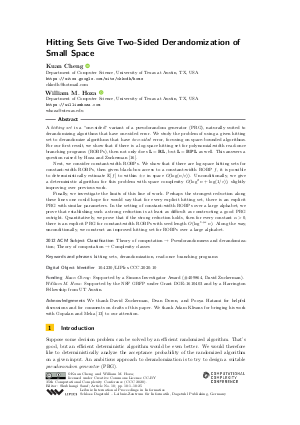@InProceedings{cheng_et_al:LIPIcs.CCC.2020.10,
author = {Cheng, Kuan and Hoza, William M.},
title = {{Hitting Sets Give Two-Sided Derandomization of Small Space}},
booktitle = {35th Computational Complexity Conference (CCC 2020)},
pages = {10:1--10:25},
series = {Leibniz International Proceedings in Informatics (LIPIcs)},
ISBN = {978-3-95977-156-6},
ISSN = {1868-8969},
year = {2020},
volume = {169},
editor = {Saraf, Shubhangi},
publisher = {Schloss Dagstuhl -- Leibniz-Zentrum f{\"u}r Informatik},
address = {Dagstuhl, Germany},
URL = {https://drops.dagstuhl.de/entities/document/10.4230/LIPIcs.CCC.2020.10},
URN = {urn:nbn:de:0030-drops-125625},
doi = {10.4230/LIPIcs.CCC.2020.10},
annote = {Keywords: hitting sets, derandomization, read-once branching programs}
}

 Creative Commons Attribution 3.0 Unported license
Creative Commons Attribution 3.0 Unported license









